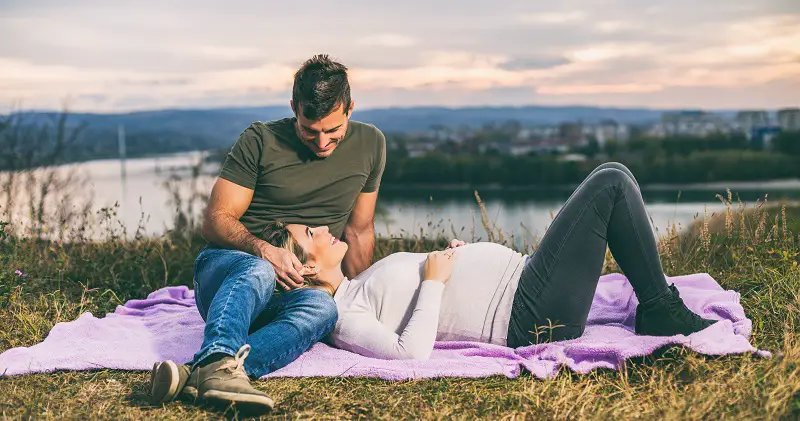Share this post:

You’ve got a baby bump, but you’ve also got an itch for the great outdoors. Fear not, for you can do it all. After all, Sacagawea got her and her baby over the Rockies the day after he was born. Life doesn’t have to wait!
For some, it may just be the thrill of being surrounded by nature that makes camping (even while pregnant) an alluring experience. If you’re used to camping and being quite active during your trip, pregnancy will slow you down a bit, but it doesn’t have to stop you altogether.
To help out we have taken the most common questions asked by our readers about camping while pregnant and answered them in this post.
Clickable Table Of Contents
Is it safe to go camping when pregnant?
Camping during pregnancy can be safe, but it’s important to take certain precautions to ensure the well-being of both the mother and the developing baby.
We cover each trimester below but here are some general considerations and safety tips for pregnant women who plan to go camping:
- Consult with Your Healthcare Provider: Before planning any outdoor activities, including camping, it’s crucial to consult with your healthcare provider. They can provide personalized advice based on your health, the stage of your pregnancy, and any specific considerations.
- Choose a Safe Location: Select a camping location that is easily accessible, not too remote, and has access to emergency services if needed. Consider the proximity to medical facilities and the ease of evacuation in case of an emergency.
- Pack Comfortable Gear: Ensure you have comfortable and supportive gear, including a well-insulated sleeping pad and a comfortable sleeping bag. Prioritize comfort and support to help prevent discomfort and fatigue.
- Stay Hydrated: Pregnant women need to stay well-hydrated. Bring an adequate supply of water and avoid dehydration, especially in warm weather.
- Avoid Extreme Conditions: Be mindful of weather conditions. Extreme temperatures, whether hot or cold, can pose risks during pregnancy. Dress appropriately, stay cool, and avoid overheating.
- Watch Your Step: Pay attention to your surroundings and be cautious when walking on uneven terrain. Pregnancy alters your center of gravity, and hormonal changes can affect ligaments, making you more prone to falls.
- Plan for Comfortable Sleeping: Ensure that you have a comfortable sleeping setup. Consider a camping mattress that provides ample support, and arrange pillows for added comfort.
- Stay Insect Safe: Protect yourself from insect bites by using appropriate insect repellent and wearing long sleeves and pants, especially during dawn and dusk when mosquitoes are most active.
- Mind Food Safety: Practice safe food handling to avoid foodborne illnesses. Pack and store perishable foods properly, and cook meats thoroughly.
- Listen to Your Body: Pay attention to how you feel and listen to your body. If you experience any unusual symptoms, such as dizziness, shortness of breath, or contractions, seek medical attention promptly.
Remember, every pregnancy is unique, and what may be suitable for one woman may not be for another. Always consult with your healthcare provider to discuss your specific situation and get personalized advice tailored to your health and pregnancy.
Many women on the Health Care Center blog have posted about going camping while pregnant – You can see what they had to say here.
Is it safe to go camping when pregnant first trimester?
Camping during the first trimester of pregnancy can be safe for many women, but it’s important to consider individual health and any specific circumstances.
Here are some general guidelines and considerations for camping during the first trimester:
- Consult with Your Healthcare Provider: Before planning any outdoor activities, including camping, it’s crucial to consult with your healthcare provider. They can provide personalized advice based on your health, medical history, and the specific circumstances of your pregnancy.
- Choose a Safe Location: Select a camping location that is easily accessible, not too remote, and has access to emergency services if needed. Consider factors such as proximity to medical facilities and ease of evacuation in case of an emergency.
- Be Mindful of Physical Activity: While mild to moderate physical activity is generally safe during pregnancy, it’s essential to be mindful of your energy levels and avoid activities that may be overly strenuous or pose a risk of falling.
- Stay Hydrated: Hydration is crucial during pregnancy. Bring an adequate supply of water and ensure you stay well-hydrated, especially if you’re camping in warmer weather.
- Monitor Your Body Temperature: Pregnant women are more sensitive to changes in body temperature. Avoid overheating, especially in hot weather, by wearing appropriate clothing, taking breaks in the shade, and staying cool.
- Get Adequate Rest: Fatigue is common during the first trimester. Plan your camping trip to allow for sufficient rest and breaks, and make sure you have a comfortable sleeping setup.
- Watch Your Step: Pay attention to your surroundings and be cautious when walking on uneven terrain. Pregnancy alters your center of gravity, and hormonal changes can affect ligaments, making you more prone to falls.
- Consider Nausea and Food Safety: If you’re experiencing morning sickness, consider the types of foods you bring and be mindful of food safety to avoid foodborne illnesses. Pack foods that are easy on the stomach.
- Bring Comfortable Gear: Ensure you have comfortable and supportive gear, including a well-insulated sleeping pad and a comfortable sleeping bag. Prioritize comfort to help prevent discomfort and fatigue.
- Limit Exposure to Insect Bites: Protect yourself from insect bites by using appropriate insect repellent and wearing long sleeves and pants, especially during dawn and dusk when mosquitoes are most active.
Remember, each pregnancy is unique, and what may be suitable for one woman may not be for another. Always consult with your healthcare provider to discuss your specific situation, get personalized advice, and ensure that camping during the first trimester is safe for you and your baby.

Is it safe to go camping when pregnant second trimester?
Camping during the second trimester of pregnancy is generally considered safe for many women. The second trimester is often referred to as the “honeymoon phase” of pregnancy because many women experience a decrease in symptoms such as nausea and fatigue, and an increase in energy and overall well-being.
However, individual circumstances and health considerations can vary, so it’s important to take certain precautions (many are the same for each trimester):
- Consult with Your Healthcare Provider: Before planning any outdoor activities, including camping, it’s crucial to consult with your healthcare provider. They can provide personalized advice based on your health, medical history, and the specific circumstances of your pregnancy.
- Choose a Safe Location: Select a camping location that is easily accessible, not too remote, and has access to emergency services if needed. Consider factors such as proximity to medical facilities and ease of evacuation in case of an emergency.
- Be Mindful of Physical Activity: While moderate physical activity is generally safe and beneficial during the second trimester, it’s essential to be mindful of your energy levels and avoid strenuous activities that may be too demanding.
- Stay Hydrated: Hydration remains crucial during pregnancy. Bring an adequate supply of water and ensure you stay well-hydrated, especially if you’re camping in warmer weather.
- Monitor Your Body Temperature: Avoid overheating, especially in hot weather. Dress appropriately, take breaks in the shade, and stay cool. Pay attention to how your body responds to changes in temperature.
- Get Adequate Rest: While the second trimester often brings increased energy levels, it’s still important to plan your camping trip to allow for sufficient rest and breaks. Ensure you have a comfortable sleeping setup.
- Watch Your Step: Be cautious when walking on uneven terrain. Pregnancy alters your center of gravity, and hormonal changes can affect ligaments, making you more prone to falls.
- Consider Comfortable Gear: Ensure you have comfortable and supportive gear, including a well-insulated sleeping pad and a comfortable sleeping bag. Prioritize comfort to prevent discomfort and fatigue.
- Limit Exposure to Insect Bites: Protect yourself from insect bites by using appropriate insect repellent and wearing long sleeves and pants, especially during dawn and dusk when mosquitoes are most active.
- Pack a Maternity Kit: Include essentials like prenatal vitamins, any necessary medications, and items that provide comfort and support during pregnancy.
Always follow your healthcare provider’s guidance and pay attention to your body. If you experience any unusual symptoms or discomfort, it’s important to seek medical attention promptly.
Is it safe to go camping when pregnant third trimester?
Camping during the third trimester of pregnancy requires careful consideration, and it’s essential to prioritize safety and comfort.
You will need to take into account all of the advice above for the first and second trimesters.
While camping during the third trimester is possible for many women, it may not be suitable for everyone, especially those with high-risk pregnancies or specific medical conditions.
Always follow your healthcare provider’s guidance and pay attention to your body. If you experience any unusual symptoms or discomfort, seek medical attention promptly. Additionally, it’s advisable to camp with a partner or group who can assist if needed.

When should I stop camping while I’m pregnant?
Deciding when to stop camping during pregnancy depends on various factors, including your health, the specific circumstances of your pregnancy, and your level of comfort. While many women can safely continue camping well into their pregnancies, there may come a point when it becomes less practical or comfortable.
Here are some considerations:
- Consult with Your Healthcare Provider:
- Always consult with your healthcare provider to get personalized advice based on your health and the specific circumstances of your pregnancy.
- They can provide guidance on when it might be appropriate to stop certain activities, including camping.
- Consider Your Physical Comfort:
- As your pregnancy progresses, you may find it more challenging to engage in certain physical activities or sleep comfortably in a tent.
- Pay attention to your physical comfort and make adjustments as needed.
- Take The Terrain Into Account:
- Consider the type of camping you plan to do and the terrain involved.
- If you’re dealing with challenging or uneven terrain, it may become more difficult as your pregnancy advances.
- Pregnancy-Related Symptoms:
- If you experience complications, increased discomfort, or pregnancy-related symptoms that make camping challenging, it might be a sign to limit or stop camping.
- Common symptoms include back pain, fatigue, and increased difficulty sleeping.
- Timing:
- Many women find the second trimester to be the most comfortable for outdoor activities, as symptoms like nausea often decrease, and energy levels increase.
- However, individual experiences vary.
- Proximity to Medical Facilities:
- Consider the proximity of your camping location to medical facilities.
- If you are in a remote area, it may be advisable to stop camping as you approach your due date or if you have any high-risk conditions.
- Weather Conditions:
- Extreme weather conditions can pose risks during pregnancy.
- Consider the weather conditions during your planned camping trip, especially if they are extreme or unpredictable.
- Personal Comfort and Preferences:
- Ultimately, the decision to stop camping during pregnancy is a personal one.
- If you no longer find camping enjoyable, or if it causes increased stress or discomfort, it may be a good time to pause or modify your outdoor activities.
Always prioritize your health and well-being, and be flexible with your plans.
If you have any concerns or questions about camping during your pregnancy, discuss them with your healthcare provider. They can provide guidance based on your specific health situation and help you make informed decisions about outdoor activities during pregnancy.

What is the essential checklist for a pregnant woman?
When pregnant and planning a camping trip, it’s important to be well-prepared to ensure comfort, safety, and a positive experience.
Every person is different but we have compiled a checklist covering the essential categories for camping pregnant. We created this list for flexibility, so it can be easily adapted to just about anyone.
Health and Safety:
- Consult with your healthcare provider and get approval for camping.
- Carry a copy of your prenatal records and emergency contact information.
- Pack any necessary medications, prenatal vitamins, and medical supplies.
- Have a first aid kit with basic supplies for minor injuries.
- Know the location of the nearest medical facilities.
Comfort and Sleep:
- Comfortable and supportive sleeping pad.
- Comfortable sleeping bag appropriate for the weather.
- Extra cushions or pillows for added support.
- Consider a camping pillow for neck support.
Clothing:
- Comfortable and breathable clothing that accommodates your changing body.
- Dress in layers to adapt to changing temperatures.
- Comfortable, supportive footwear for walking and hiking.
Hydration and Nutrition:
- Sufficient water supply or a reliable water source.
- Nutritious snacks and meals to keep energy levels up.
- Consider smaller, more frequent meals if you experience nausea.
- Reusable water bottle for staying hydrated.
Protection from Elements:
- Sunscreen with a high SPF to protect against UV rays.
- Hat and sunglasses for sun protection.
- Insect repellent to prevent bug bites.
- Rain gear (jacket and pants) in case of unexpected rain.
Camping Gear:
- Well-ventilated and spacious tent for comfort.
- Compact camping stove for cooking meals.
- Camping cookware and utensils.
- Headlamp or flashlight for navigating in the dark.
- Portable camping chair for comfortable seating.
Personal Items:
- Personal hygiene items, including wipes and hand sanitizer.
- Maternity support belt if needed for added comfort.
- Comfortable and supportive bra.
- Portable camping toilet or know the location of campsite facilities.
Entertainment and Relaxation:
- Books, magazines, or entertainment for relaxation.
- Consider a comfortable camping chair for lounging.
- Relaxing activities such as meditation or gentle yoga.
Communication:
- Fully charged cell phone with a portable charger.
- Communication plan with camping companions in case of emergencies.
Miscellaneous:
- Map of the camping area and surrounding trails.
- Multi-tool or camping knife for various tasks.
- Extra blankets or layers for warmth.
- Binoculars for observing nature.
Remember to adapt this checklist based on your specific needs and preferences.
It’s crucial to prioritize comfort and safety during pregnancy, and you may need to modify your camping routine accordingly. Always consult with your healthcare provider before embarking on any outdoor activities during pregnancy.
Is it OK to be around a campfire while pregnant?
Being around a campfire during pregnancy is generally considered safe when done right but it’s important to take certain precautions to minimize potential risks.
It’s important to note that the CDC says “Smoke contains several hazardous chemicals, including Gases, carbon monoxide (also called CO), a gas that is especially toxic and dangerous for a developing baby.”
With that in mind, here are some tips to ensure a safe experience around a campfire while pregnant:
- Avoid Inhaling Smoke:
- Position yourself upwind of the campfire to minimize exposure to smoke.
- Inhaling smoke, whether from tobacco or a campfire, is not recommended during pregnancy.
- Stay at a Comfortable Distance:
- Maintain a comfortable distance from the fire to avoid excessive heat exposure.
- Pregnant women can be more sensitive to heat, so it’s important not to get too close.
- Choose the Right Wood:
- Use dry, seasoned wood to minimize the production of smoke and pollutants.
- Green or damp wood can produce more smoke, which may be irritating.
- Avoid Direct Contact:
- Avoid direct contact with the fire and hot surfaces.
- Be cautious when sitting near the fire to prevent burns or accidental contact with hot embers.
- Wear Protective Clothing:
- Consider wearing long sleeves and pants to protect your skin from sparks and embers.
- Natural fabrics like cotton are preferable.
- Stay Hydrated:
- Pregnancy increases the body’s need for hydration.
- Be sure to drink plenty of water to stay well-hydrated, especially if you’re spending time near a campfire.
- Pay Attention to Fire Bans:
- Check for any fire bans or restrictions in the camping area.
- Authorities may implement restrictions during dry or fire-prone conditions.
- Be Mindful of Terrain:
- Pay attention to the terrain around the campfire.
- Uneven ground or obstacles may pose a risk, especially as your center of gravity changes during pregnancy.
- Communicate with Camping Companions:
- Inform your camping companions about your pregnancy and any specific concerns or needs you may have.
- Ensure that they are aware of safety precautions.
Always prioritize your safety and well-being during pregnancy. If you have any specific health concerns or if you experience discomfort while around the campfire, it’s advisable to move to a safer location or consult with your healthcare provider. Additionally, consider adapting your camping routine based on your individual comfort and health needs during pregnancy.
There you have it, our most commonly asked questions with thoughtful and important answers. If you have additional questions, be sure to ask in the comments section and we will get them added to this article.
